"I'm amazed at how lucky I am"
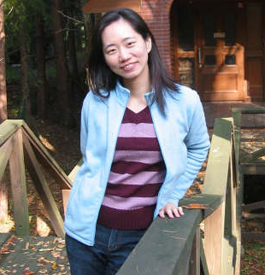
Name: Ho Tzo I
Age: 29
Nationality: Taiwanese
Program: Doctoral Course
Major: Department of Cultural Sciences, Graduate School of Integrated Arts and Sciences
Hobbies: Travel (US, Bali, South Korea, Japan)
For our fifth edition of "Voices", I interviewed Ho Tzo I, a Doctoral student in the Department of Cultural Sciences. She is the perfect example of "learning is the greatest joy" -- whether researching or relaxing, she always has a book close at hand. With a bright smile and a personality to match, Ho Tzo I is working toward her dream of becoming a Japanese language teacher in Taiwan. But what is it that motivates and supports her both her studies and everyday life? Find out in this edition of "Voices from Abroad"!
Thank you so much for allowing me to interview you today. Let me begin by asking how many years you have been here in Japan and why you decided to come to here?
I've been here 4 years. I had always considered studying abroad but money was an issue. It was then that I received a scholarship from an exchange association, and I came to Japan. As for why I came to Japan, I had studied Japanese beginning at a technical college and through university, so if I was going to study abroad anywhere, I wanted to study in Japan.
I see. So what got you interested in the Japanese language?
Hmm...I had a strong interest in languages ever since middle school. After I graduated middle school I went straight to a language institute without going to high school, thinking I would study English or some other language. Honestly, I had originally wanted to study English (laughs) but since my professor was a Japanese language specialist...(I decided to study Japanese). I suppose it was fate. So I studied Japanese and here I am.
Wow, you must have had a really strong interest in languages to go right to a language institute after middle school! So what made you choose Hiroshima University?
My professor at my university was a graduate of Hiroshima University, so when he recommended that I go there as well, I didn't even hesitate in agreeing (laughs). Usually one would go online and research universities in Japan, right? But for me, when my teacher suggested that I go, I said "okay!" and jumped right in (laughs).
What sorts of impressions did you have of Japan when you first arrived?
It was my first time in Saijo, and so when I arrived in Higashi-Hiroshima by shinkansen (the bullet train), I thought, "Wow, this really is out in the country!"(laughs). But I had expected as much, since my professor had told me all about Saijo. My impression of Japan is, well...I would have to say that I personally really like it here. Whether I'm traveling around Japan or just researching here, so many people come to my aid...Japanese people are truly very kind. But, even though I've been here 4 years, I still can't get used to Japanese winters. My hometown is in the south of Taiwan, so every year I'm freezing here! It's a wonder I managed to survive last winter (laughs). Actually, the first time I ever saw snow was in Japan. I was so excited that I ran outside wearing just normal house clothes, showing "Snow!" (laughs). But now, it's just "oh, snow again?"
Must have been exciting to see snow for the first time in your life. What's it like for you to study here at HU?
My work is mainly centered on research. I don't belong or any clubs, and right now I'm actually writing my thesis, so it's a lot of work. From the time I open my eyes in the morning until I go to bed at night it's thesis, thesis, thesis. On days where I have presentations to make, I'm frantic with preparations. But, when I don't have presentations to make, I read my favorite books, journals, essays, comics, fashion magazines...I really love to buy books, but they tend to pile up (laughs). And of course, the books I read have absolutely nothing to do with my research. I also like reading travel guides and books on interior design. I suppose you could say I have a lot of hobbies, but that's how I deal with stress.
What exactly is your thesis about?
I'm researching Osamu Dazai (Japanease author), so I spend my days reading his works or theses about his works. There's a huge feeling of accomplishment in discovering something new, and a joy in knowing you can overcome whatever comes next. I started making presentations about my research this year and in November, I'll be making a presentation at a conference in Tokyo, so things are a bit busy now (laughs). But I mostly make presentations in Hiroshima in front of professors and students that I know, so I don't really get too nervous, but I sometimes get asked tough questions by my professors. Then I get nervous.
I can only imagine (laughs). To change the subject, it's been 4 years since you came here -- is there any memory that particularly stands out to you?
There are many, but I suppose the one that stands out the most was when I ended up having to go to the hospital. A colleague of mine took me to the hospital, and what surprised me was that my advisor was already waiting for me there! He was very worried about me, and I was given help by so many people. They helped me walk, bought me food, and it really conveyed the goodness of the Japanese people to me. If I hadn't have had that experience, I probably would never have known just how much I am supported by those around me.
I'm glad that your unpleasant experience turned into a good memory. In what ways do the graduate students and teaching staff around you support you in your studies and everyday life?
While I love my research, sometimes I need a change of pace. In times like those, it's really refreshing for me to chat with the other graduate students in my research room. For example, one day I was feeling a little down, and an upperclassman said to me, "hey, let's go outside." It was snowing that day, and he suggested that we go look at the pretty snow -- he could see that I was down and thought that going outside would cheer me. It was really thoughtful. Another way they support me is by checking my Japanese (laughs). Actually, since there are relatively few upperclassmen in my research room now, it's my professors who carefully check my Japanese for me. They don't just check my grammar either, but also the construction of my thesis and my arguments, and they give me advice as well. I'm amazed at how lucky I am to have such kind professors -- and of course the graduate students around me are kind too!
I'm so glad to hear it! Things must be pretty busy for you now, but what kind of work would like you like to do once you graduate?
I'd like to go back to Taiwan and become a Japanese teacher. The more time I spend researching, the more I realize that there are still so many things I don't know; this is especially true when I give presentations. I really get a feel for my weak points when my professors and fellow students ask me questions after my presentation. I'm always thinking that I still have a long way to go (laughs). A classmate of mine put it like this: you learn and are able to grow more by being asked questions. After question and answer sessions, I always thinking that I should have researched more, but that actually becomes motivation for me for the next time.
That's terrific. So what made you want to become a teacher?
When I think about my own experiences in studying Japanese, it was something that I learned very naturally. Since all my courses at the language institute and at university were conducted entirely in Japanese, I didn't start to learn Japanese by learning grammar like most students. I spoke and understood Japanese, but wasn't exactly aware of the why's and how's. So when I tried teaching Japanese, the things that I didn't know and didn't understand because very clear, and it actually was a huge motivation for me. Since my own understanding was vague, it was difficult to explain things to my students. When asked about a grammar point, I would have to look for the answer myself, which became a way for me to both confirm what I already knew and to study Japanese even more. Learning and teaching both really drive and motivate me. They're just too much fun (laughs).
After all "Learning is the greatest joy," right? (laughs)
Exactly! (laughs)
But of course studying isn't everything, right? How did you make friends here at HU?
By becoming friends with the graduate students in my research room and with Taiwanese students, they in turn introduced me to other students, and my circle of friends really expanded. There are very few Taiwanese students on campus, but we're all really good friends. Every time there is a big event or festival, we all gather together and go. For example, we run a booth at the Sake Festival in Saijo every year. Actually, it's the "Taiwanese Student Association" that officially works the stand where we make and sell pan-fried bifun and tea eggs.
Does the Taiwanese Student Association hold events often?
We hold end of the year parties and welcome parties too. Since we have our own homepage, Taiwanese students who want to come to HU look at our homepage and ask us questions. The biggest request we get is "Tell me more about HU".
As the Internet is a part of life in Taiwan, having a webpage is a convenient way to spread information. The homepage itself was originally created for Taiwanese students on the HU campus to exchange information. For example, students who were going back to Taiwan used it to sell their electronics or furniture, and it also provided support for new students and event information. Then it seems that Taiwanese students looking for information about HU on the web stumbled across our page, and things took off from there.
So thanks to the network, you didn't feel alone in your new home?
Actually when I came to Japan, the network hadn't yet been established. However, all the Taiwanese students would gather once or twice a year, so they were like a family to me. Sometimes Taiwanese underclassmen start to feel down for one reason or another (sometimes I do too), and when that happens, I have them come to my research room and I listen to what's bothering them. Since we communicate in our own native language, we can both completely communicate our feelings. I feel like since they're also Taiwanese, I can say what I think and feel outright and head-on. It really makes us both feel better.
Looks like the network really supports you in a variety of ways.
It's not just the network either -- my Japanese friends, colleagues, and professors all support me too, as well as my Taiwanese friends...it's sort of like having a big family. It's more like because I have this support network that I'm able to enjoy my research here.
Do you think you'll miss this lifestyle once you graduate?
Definitely. All the upperclassmen I know who have graduated all say that they miss it here. But, some of them come back to Japan once or twice a year to visit, so even after going back to Taiwan, the connections to HU continue because our network is so strong.
I'm glad to hear it. I hope you'll come back to HU too! Well, our interview is nearly at a close; is there any advice you might have for students wanting to study at HU?
There are so many exciting aspects of being an international student, but it's not all fun and games. There are tough times too. So I think it's a good idea to find a way to relieve stress that fits with your lifestyle. Making friends and talking together, going to trips, playing sports -- there are many ways of relieving stress, but the important thing is finding which method suits you best. If you get rid of the stress from your day each and every day, then that stress won't build up.
For me, I relieve stress by singing, going on trips, and reading books that have nothing to do with my research (laughs). It's all well and good to save up money and go on a trip somewhere for winter or summer vacation as a means of relieving stress, but on the other hand, while saving up money and waiting for the vacation to come before relaxing, you may end up even more stressed. So rather than waiting for a vacation to relax, take time each day to refresh your mind and relax.
That's really great advice! Thank you so much! Good luck with your thesis, and I'll be stopping by your booth at the Sake Festival next year (laughs)!
Good to hear (laughs) Thank you!
Photo Gallery
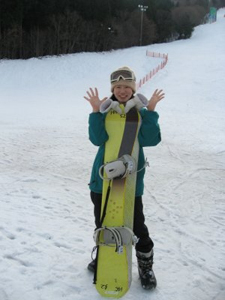
On a ski trip.
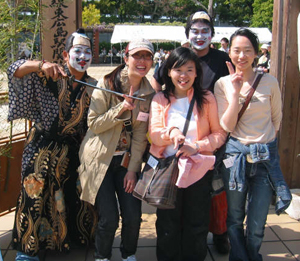
With friends.
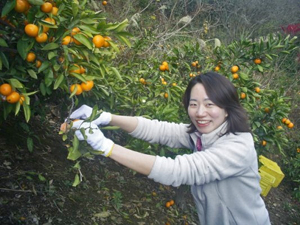
Picking mikan oranges.
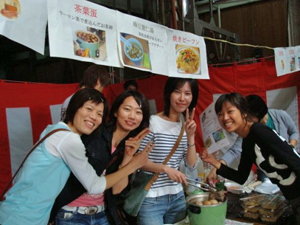
Taiwanese student booth at the Sake Festival.


 Home
Home